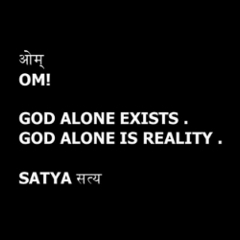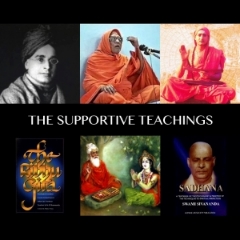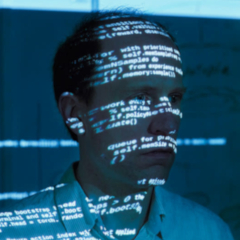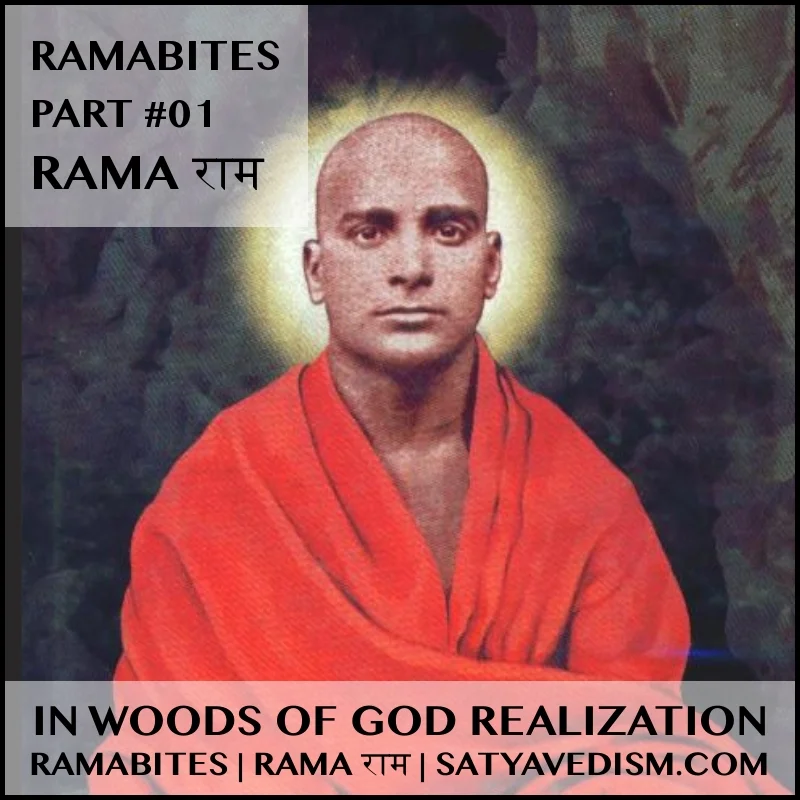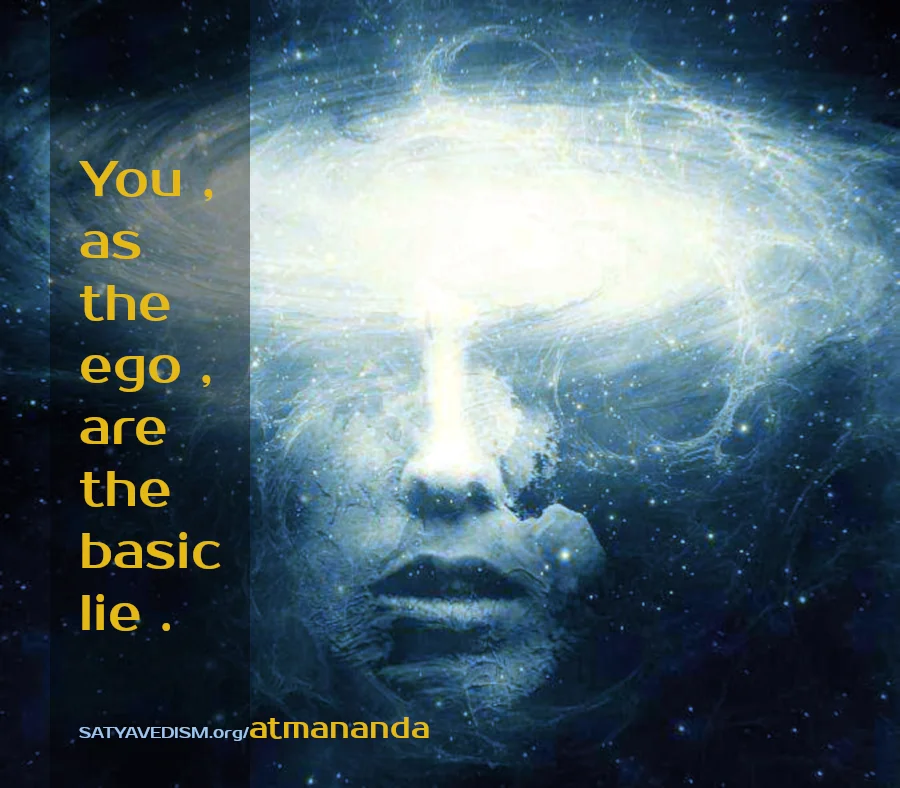TROTA | CHAPTER 4 | SEL0432 TO SEL0444
| | homeTROTA | CHAPTER 4 | SEL0432 | SWAMI KRISHNANANDA
|| 4.04 | SPACE TIME & CAUSATION ||
The Imperishable Being is declared as That in which space is woven breadthwise and lengthwise , in which is everything that is above the heaven , beneath the earth , between the heaven and the earth , that which is past , present and future , as woven within and throughout through space .
" This BRAHMAN has neither front nor behind , neither inner nor outer . "
IT is the spaceless infinitude " which is beneath and above , to the west and the east , to the south and the north ; IT alone is this whole existence " . ( Chh . Up . VII . 25 )
" IT is infinite on all sides . "
TROTA | CHAPTER 4 | SEL0433 | SWAMI KRISHNANANDA
Spatiality is the admission of difference which is detrimental to the rigorous non-duality of BRAHMAN .
Space is a lapse from pure perfection , for it allows in temporality in existence .
" This Self is smaller than a grain of rice ; this Self is greater than the whole universe . " ( Chh . Up . III . 14 . 3 )
" This Self is a part of the hundredth part of the point of a hair subdivided again a hundredfold ; and this rises to Infinitude . " ( Svet . Up . V . 9 )
TROTA | CHAPTER 4 | SEL0434 | SWAMI KRISHNANANDA
Indivisibility implies independence over space , for all that is in space is divisible . Omnipresence is spacelessness . BRAHMAN is there , and that which is there is here ( vide Katha Up . II . 1 . 10 ) .
" As a Unity alone is this to be known , this immeasurable eternal being " ; " one goes to death after death who perceives duality here . " ( Brih . Up . IV . 4 . 20 , 19 )
Thus , space is transcended in BRAHMAN .
TROTA | CHAPTER 4 | SEL0435 | SWAMI KRISHNANANDA
Time , too , is denied in BRAHMAN .
" That which is past , present and future , and that which transcends this threefold distinction of time , is the indestructible OM , the All , which is BRAHMAN . " ( Mand . Up . 1 , 2 )
BRAHMAN is anadi and ananta , ie , of infinite duration , which is timelessness .
" Over that bridge ( which is the Atman ) , neither day , nor night , nor old age , nor death can cross . " ( Chh . Up . VIII . 4 . 1 )
The instantaneous duration of the flash of consciousness , its absolute immediacy of experience , its independence over limit , its non-objective nature , marks out its timeless being .
TROTA | CHAPTER 4 | SEL0436 | SWAMI KRISHNANANDA
Causation is motion , and that which is perfectly real cannot be said to move .
Movement is transitoriness of nature , but BRAHMAN is eternal .
There is no world-process in the essential Reality , for all process is change .
Changelessness is causationlessness .
The Imperishable , the akshara , is without even the least tinge of action .
TROTA | CHAPTER 4 | SEL0437 | SWAMI KRISHNANANDA
In the Brihadaranyaka Upanishad ( IV . 4 . 20 ) the Absolute is described as " the Great Oneness , unborn , unchanging , eternal , immeasurable , unblemished , exalted above space " .
Uddalaka says that all modification is only a name , a mere matter of words , not true .
IT is depicted as different from coming into being and different from not coming into being , beyond death and deathlessness .
IT is the One which the wise speak of diversely , and hence IT excludes all plurality , and therefore all relations in space , succession in time , becoming cause of an effect or effect of a cause , and all opposition of subject and object .
TROTA | CHAPTER 4 | SEL0438 | SWAMI KRISHNANANDA
The objective world of space , time and cause represents merely a condition of experience .
Space , time and causation are interdependent and none of them seems to have the character of reality .
Without the one the other cannot be explained , and the argument leads to a vicious circle .
Since reason itself is bound by these concepts , they cannot be reasoned about .
They constitute the way of thinking itself , the very stuff of all methods of knowing , and therefore human knowledge is only another name for the conscious manifestation of these relations .
Objectively nothing is known except these relations .
TROTA | CHAPTER 4 | SEL0439 | SWAMI KRISHNANANDA
Space , time and causality represent , ultimately , only ideas and nothing more .
These are the self-projections of the process of thought , in the form of an external world , in order to make possible and give value to the act of thinking .
The law of Nature is always in relation to an individual or a group of individuals , and never an eternally existent fact , except , of course , in the sense of the eternally changeless indivisible Nature of BRAHMAN .
Space , time and cause are certain manners of the perception of external conditions or objects , and thus form relations and not anything truly existent .
TROTA | CHAPTER 4 | SEL0440 | SWAMI KRISHNANANDA
The perceiving mind always wishes to work in terms of system and order , and not in a chaotic manner .
For this purpose these universally accepted relations called space , time and cause are formulated by the perceiving consciousness which is individualised and externalised .
The whole universe is summed up in the three ideas of spatiality , temporality and causality .
These are the very condition of all knowledge and experience in an individual , and hence these concepts refuse to become objects of knowledge in any way .
TROTA | CHAPTER 4 | SEL0441 | SWAMI KRISHNANANDA
Either we know everything in terms of space , time and cause or we know nothing at all .
Individuality is subject to these categories of relative experience , and so all knowledge in the universe is relative , phenomenal , a make-shift , and not ultimately valid .
As space , time and cause are the ideal necessary constructions of all empirical experience , all the objects of experience , too , are mere conditions , becomings , relative to the reality of the experiencers , and do not have independent existence .
The object of perception lasts only as long as the particular mental states of the individuals cognising the object last .
There is no permanent reality of the form of an object independent of the psychoses of the perceivers .
TROTA | CHAPTER 4 | SEL0442 | SWAMI KRISHNANANDA
Objects in their isolated nature have no reality , though the essence of the world and the individuals is absolutely real — for this essential existence belongs to what is incorruptible and unlimited .
The world of objects in its presented state is false , being dependent on relative perceptions ; its form is unreal because form is an imaginary construction of the objectified centres of consciousness in the universe driven by potent desire-impulses .
The Cosmic Mind acts as the ultimate subject whose consciousness is the creator of all norms , in all the degrees of manifestation .
The worldness in what is manifested , or , in other words , the very act or process of manifestation itself , is to be construed in the sense of what is illusory , though the world-essence or the ultimate substance of the world is eternal .
It is the form and not the essence that is unreal .
TROTA | CHAPTER 4 | SEL0443 | SWAMI KRISHNANANDA
The nature of every object is said to be fivefold — existence , consciousness , joy , name , form .
Of these , existence-consciousness-joy constitutes the self-identical immediate reality of everything , and hence it can never cease to be .
This ceaseless Self-Perfection is the Absolute .
The name and the form of the world , together with its contents , are only an apparition in the Real .
If the Absolute is the sole Reality , space , time and causation can only be meaningless terms .
TROTA | CHAPTER 4 | SEL0444 | SWAMI KRISHNANANDA
" All this is what this Self is . " ( Brih . Up . II . 4 . 6 )
" This is the Self , this is the Immortal , this is the Absolute , this is all Existence . " ( Brih . Up . II . 5 . 1 )
The failure of all arguments in determining the exact nature of Reality and its relation to appearance points to the unknowable character of Reality .
Hence it is defined as " not this , not this " .
But in the admission of our limited knowledge and our inability to know Reality is implied our claim to know it .
It is known through relative means , but it is realised in immediate experience which is above relative knowledge .
SOURCE | SATYAVEDISM.ORG











